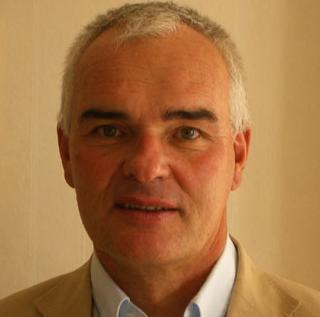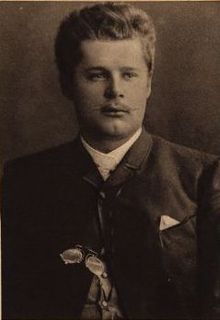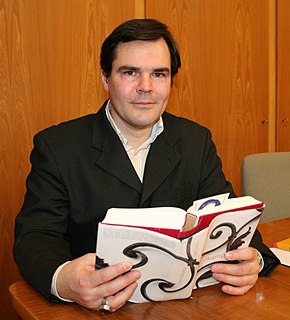 W
WKarl Georg Büchner was a German dramatist and writer of poetry and prose, considered part of the Young Germany movement. He was also a revolutionary and the brother of physician and philosopher Ludwig Büchner. His literary achievements, though few in number, are generally held in great esteem in Germany and it is widely believed that, had it not been for his early death, he might have joined such central German literary figures as Johann Wolfgang von Goethe and Friedrich Schiller at the summit of their profession.
 W
WJuan de Esteyneffer was a Moravian German lay Jesuit missionary sent to the New World. He is known for his 1711 work Florilegio Medicinal, which compiled a combination of New World traditional medicine, European materia medica, and 18th-century European medical diagnosis.
 W
WPaul Fleming, also spelt Flemming, was a German physician and poet.
 W
WCarl Wilhelm Richard Hülsenbeck was a German writer, poet, and psychoanalyst born in Frankenau, Hessen-Nassau.
 W
WJohann Heinrich Jung, better known by his assumed name Heinrich Stilling, was a German author.
 W
WJustinus Andreas Christian Kerner was a German poet, practicing physician, and medical writer. He gave the first detailed description of botulism.
 W
WDavid Ferdinand Koreff was a German physician who was a personal doctor of Staatskanzler Karl August von Hardenberg and occupied one of the two chairs for animal magnetism created in 1817 at the University of Berlin. A personal friend of E.T.A. Hoffmann and a member of his literary club The Serapion Brethren (Serapionsbrüder), Koreff authored a treatise “Über die Erscheinungen des Lebens und über die Gesetze, nach denen es im menschlichen Organismus sich offenbart” and a volume of lyric poetry "Lyrische Gedichte".
 W
WCarl Arnold Kortum was a German physician, but best known for his writing and poetry.
 W
WBerthold Lasker (also, per birth registry Jonathan Berthold Barnett) was a German physician, writer and chess master.
 W
WPetrus Lotichius Secundus or Peter Lotz was a scholar and a significant neo-Latin poet of the 16th century.
 W
WJosef Mengele, also known as the Angel of Death was a German Schutzstaffel (SS) officer and physician during World War II. He is mainly remembered for his actions at the Auschwitz concentration camp, where he performed deadly experiments on prisoners, and was a member of the team of doctors who selected victims to be killed in the gas chambers and was one of the doctors who administered the gas. With Red Army troops sweeping through Poland, Mengele was transferred 280 kilometres (170 mi) from Auschwitz to the Gross-Rosen concentration camp on 17 January 1945, just 10 days before the arrival of the Soviet forces at Auschwitz.
 W
WBartholomäus Metlinger was a German physician of the late Middle Ages.
 W
WWolfgang Müller von Königswinter was a German novelist and poet. He settled in Cologne, and became a popular poet, novelist, and chronicler of the Rhine region.
 W
WKlaus F. Müller is a German dentist and European pioneer of modern dental implantology. He grew up in Sinn in Hesse, Germany, where he was born on July 20, 1949.
 W
WLeopold Hermann Oskar Panizza was a German psychiatrist and avant-garde author, playwright, novelist, poet, essayist, publisher and literary journal editor. He is best known for his provocative tragicomedy, Das Liebeskonzil, for which he served a one-year prison sentence after being convicted in Munich in 1895 on 93 counts of blasphemy. Upon his release from prison, he lived for eight years in exile, first in Zürich and later in Paris.
 W
WJohann Christoph Friedrich (von) Schiller was a German poet, philosopher, physician, historian, and playwright. During the last seventeen years of his life (1788–1805), Schiller developed a productive, if complicated, friendship with the already famous and influential Johann Wolfgang von Goethe. They frequently discussed issues concerning aesthetics, and Schiller encouraged Goethe to finish works he left as sketches. This relationship and these discussions led to a period now referred to as Weimar Classicism. They also worked together on Xenien, a collection of short satirical poems in which both Schiller and Goethe challenge opponents of their philosophical vision.
 W
WCarl Ludwig Schleich was a German surgeon and writer. He is best known for his contribution to clinical anesthesia. In addition, he was also a philosopher, poet and painter.
 W
WAlbert Schweitzer was an Alsatian polymath. He was a theologian, organist, writer, humanitarian, philosopher, and physician. A Lutheran, Schweitzer challenged both the secular view of Jesus as depicted by the historical-critical method current at this time, as well as the traditional Christian view. His contributions to the interpretation of Pauline Christianity concern the role of Paul's mysticism of "being in Christ" as primary and the doctrine of Justification by Faith as secondary.
 W
WAngelus Silesius, born Johann Scheffler and also known as Johann Angelus Silesius, was a German Catholic priest and physician, known as a mystic and religious poet. Born and raised a Lutheran, he adopted the name Angelus and the epithet Silesius ("Silesian") on converting to Catholicism in 1653. While studying in the Netherlands, he began to read the works of medieval mystics and became acquainted with the works of the German mystic Jacob Böhme through Böhme's friend, Abraham von Franckenberg. Silesius's mystical beliefs caused tension between him and Lutheran authorities and led to his eventual conversion to Catholicism. He took holy orders under the Franciscans and was ordained a priest in 1661. Ten years later, in 1671, he retired to a Jesuit house where he remained for the rest of his life.
 W
WUwe Tellkamp is a German writer and physician. He practised medicine until 2004. Before the fall of communism, he was enlisted in the National People's Army as a tank commander and imprisoned when he refused to break up a demonstration in October 1989. Until the fall of the German Democratic Republic shortly after, he was prohibited from studying medicine.
 W
WFriedrich Wilhelm Weber was a German doctor, politician of the Prussian House of Deputies, and poet.
 W
WPaul Gottlieb Werlhof was a German physician and poet who was a native of Helmstedt.
 W
WFriedrich Wolf was a German doctor and politically engaged writer. From 1949 to 1951, he served as East Germany's first ambassador to Poland.
 W
WChristiane Woopen is a German medical ethicist. She was appointed Professor for Ethics and Theory of Medicine at the University of Cologne in 2009. There she is Executive Director of ceres, an interdepartmental institution created by the Rector and five of the six Faculties of Cologne University. Furthermore, she is Head of the Research Unit Ethics at the Faculty of Medicine and Vice-Dean for Academic Development and Gender of that Faculty. From 2012 to 2016 she was Chair of the German Ethics Council and from 2014 to 2016 President of the Global Summit of National Ethics/Bioethics Committees. She has been portrayed by various periodicals.